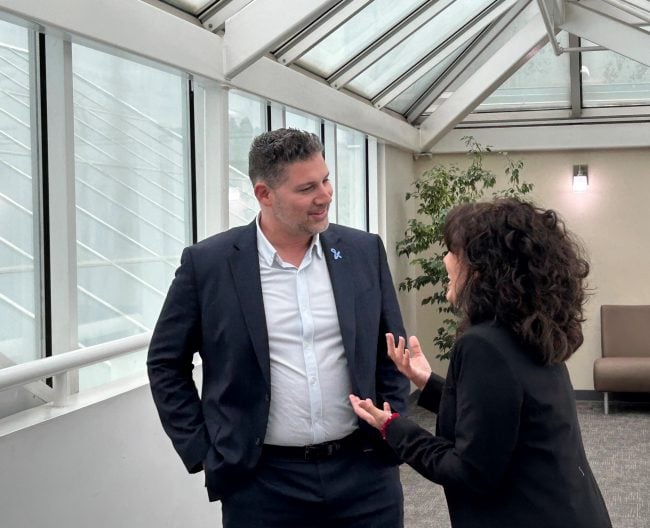Not all trailblazers strike out for the frontiers. Sometimesblazing trails means leading people back through terrain theythought they knew in order to rediscover treasures they forgot theylost.
|Consider the winner of the Credit Union Times LendingOfficer of the Year for 2013.
|DonaSvehla, is the senior vice president of retail lending and lossprevention for the 156,000-member $1.8 billion Grow Financial FederalCredit Union based in Tampa, Fla.
|Unlike many other credit union or bank lending executives,Svehla came to the position 18 months ago not through the lines ofunderwriting or marketing but instead from collections, an areathat she considers a largely undervalued and misunderstood part ofmaking and servicing loans.
|“Understanding and correctly managing a collections program isan absolutely essential part of any healthy lending program,whether you are making personal loans, credit card loans, autoloans or mortgage loans,” Svehla said. She added that its necessitystems from the reality that some percentage of loans will always gobad, and a credit union needs to have a mechanism in place toaddress what happens when life intrudes onto a loan's carefullyplanned payment schedule.
|“We evaluate our loans across their entire life cycle, and thatincludes collections” Svehla said. A healthy lending program needsto have more than just strong marketing and underwritingcomponents, what she called the popular parts of lending. It alsohas to have a strong component that address what happens when loansget into trouble–the unpopular part of lending. Making loans iseasy, she said, everyone likes notifying members to let them knowtheir loans have been approved, but that's never the entirestory.
|“Not all loans are alike, not all members are alike and somemembers and loans will have more problems than others,” she said.“That's just life. Collections are how you help your members dealwith those challenges.”
|Svehla also acknowledged that, due to the Great Recession andslow recovery, she and the other staff at Grow Financial have hadplenty of experienced at honing and improving their collections andother loss prevent strategies.
|“It has been crazy,” Svehla said, referring to the economicheadwinds Grow Financial has faced and observing that she began hercareer in collections with Grow Financial in 2008, right at thepoint when Florida began heading into the very teeth of the GreatRecession and its impact on members. At its worst, in 2010, 3.92%of the credit union's loans, worth 2.94% of its assets, weredelinquent and 2.04% of its average loans charged off. The numbersdropped in 2011 and then again last year, to where 2012 ended with2.12% of the credit union's loans, or 1.40% of its assets,delinquent and 1.46% of its average loans charged off, according toNCUA records.
|But while the credit union's statistics suggest Grow's improvingloan picture, the real details come in the actual money saved.According to credit union records, since Svehla assumed the helm ofthe lending program in 2011, overall gross charge-offs dropped bymore than $8.5 million, gross auto charge-offs by more than $1.8million and gross credit card charge-offs by more than $1 million,all while recoveries increased by more than $1 million.
|“We are getting better slowly,” Svehla commented about theFlorida economy and the credit union but added that the state'sunemployment rate still remained higher than the national averageand that Florida is still one of the states with the slowest paceof foreclosures in the country. This means that the impacts of therecession on the real estate and mortgage markets, as well as onGrow's bottom line, would continue to stretch out over time.
|“I don't predict how long it's going to take to see the realestate market really recover,” she said. There was some hope that asilver lining to the long foreclosure process might be that creditunion might be able to avoid taking possession of some of itstroubled properties as a stronger real estate market makes shortsales more likely and less damaging from the credit union's pointof view. According to NCUA records, Grow foreclosed on 14 realestate loans this year.
|Svehla also sought to streamline the communications between allparts of the lending operation so that what collection staff werediscovering about troubled loans could be communicated to andunderstood by other staff in other parts of the loan cycle. Inthis, Svehla said she puts more value on data about delinquencythan data about charge-offs, since charge-offs are so often alagging indicator.
|“Most charge-offs are so old that when you analyze the loanproblems, you find out you are not making loans that way any longeranyway,” she said. She puts more stock in delinquency numbersbecause they often provide more of a real time window on what'sgoing on in a given loan program.
|For example, Svehla related how data that was coming tocollections staff about new car loan delinquency led auto lendingunderwriters to start looking more carefully at how they evaluatedauto loan applications from borrowers who were in a new job for thefirst time or after a long time away from work. “We decided weneeded to see more time in that job for some of these loans,” shesaid.
|Central to Grow's collection philosophy is to see whatever ishappening with a loan in the context of the overall memberrelationship with the goal of preserving that relationship into thefuture. A member with a delinquent loan because of job loss orother family or career difficulty will likely not be in thatsituation forever, Svehla observed, and when they come out of itthey are likely going to need another loan for something else.
|By training collections staff to work with members to come upwith a workable solution to their loan problems, Grow helps memberscontinue to build trust and reliance on the credit union eventhrough a dark point in their financial lives. Doing this, shepointed out, means the credit union has a pool or members who areeven more loyal to the credit union and who willing to stand by theinstitution that has stood by them in the past.
Complete your profile to continue reading and get FREE access to CUTimes.com, part of your ALM digital membership.
Your access to unlimited CUTimes.com content isn’t changing.
Once you are an ALM digital member, you’ll receive:
- Critical CUTimes.com information including comprehensive product and service provider listings via the Marketplace Directory, CU Careers, resources from industry leaders, webcasts, and breaking news, analysis and more with our informative Newsletters.
- Exclusive discounts on ALM and CU Times events.
- Access to other award-winning ALM websites including Law.com and GlobeSt.com.
Already have an account? Sign In
© 2024 ALM Global, LLC, All Rights Reserved. Request academic re-use from www.copyright.com. All other uses, submit a request to [email protected]. For more information visit Asset & Logo Licensing.









